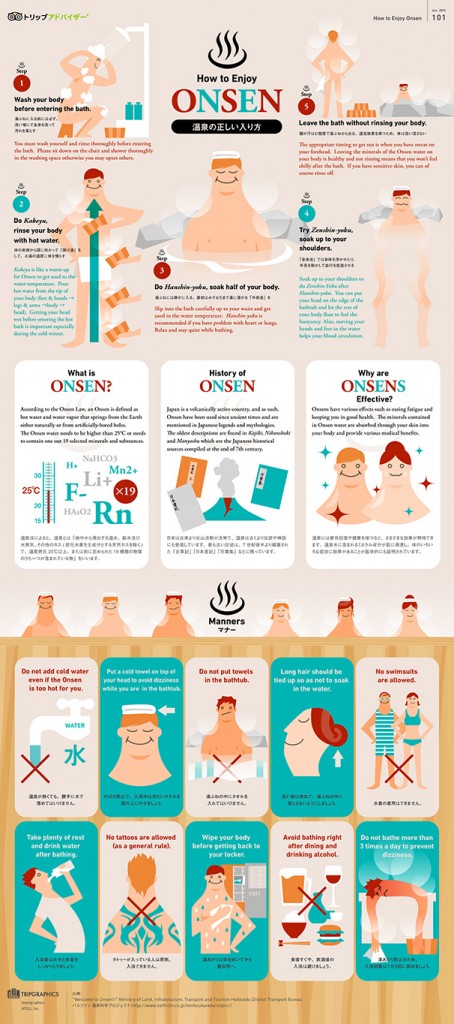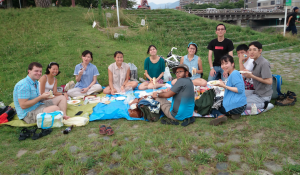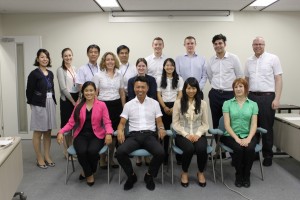JET alum author completes trilogy of books on JET and Japanese baseball
—————
James McKnight (Gunma-ken, 2001-03) recently published Life, Love & Baseball in Japan, the third book in his series in which he shares stories of life as a JET and his experiences as a devoted Hanshin Tigers fan.

Here’s a synopsis in James’ own words:
“Basically, I went to Japan on vacation in 2000 and met some fervent Hanshin Tigers fans when I dared to enter the Koshien left field bleachers on my own for a Giants v. Tigers game. Of course the Tigers lost to the Hideki Matsui-led Giants, but the experience left a deep impression on me since I had always been a fan of underdog teams like the Cleveland Indians and Seattle Mariners. I kept in touch with the fans I met that night and eventually moved to Japan in 2001 to work as a JET ALT. Unfortunately, I was placed in Gunma-ken, not Kansai as I requested, so I was far from Koshien. This did not deter me and I reunited with my friends and became a member of the ouendan they led. I ended up living in Gunma for 12 years and followed the Tigers at home and away games the entire time I lived there.”
“Upon moving back to the U.S., I felt my experiences with my Tigers friends changed my life so much that I wanted to share my stories with other baseball fans and people interested in Japanese culture/education. My first book, “Yellow & Black Fever,” was published on Amazon in 2020, followed by “Bad Foreigner,” in 2021. The first book was translated into Japanese and separated into two short versions in 2022 & 2023.”
“My most recent book, “Life, Love & Baseball in Japan -The Final Chapter,” follows my experiences from 2006-2013 following the Tigers as well as life events like starting a family in Japan and learning how to adapt to being a full-time English teacher (not an ALT) in a college-prep school.”
Rural Reflections: JET alum Marshall Hughes shares an unseen side of Japan in his memoir of teaching in the inaka

Posted by: Margie Banin (Kochi-ken, 2005–2007), a former CIR with a love of the written word. Currently she connects others to Japan through translating, writing, and editing texts on Japan. Margie also manages the JETwit Bluesky account, serves as the JETwit Volunteer Coordinator and a JETwit jobs-list welcomer, and engages in various other JETwit outreach activities.
A number of books over the years have been written about the JET (and non-JET) teaching experience in Japan. JET alum Marshall Hughes (Tochigi-ken, 1990–1991; Ibaraki-ken, 1992–1995) has recently added to this genre with Rural Reflections: What 11 Years in Provincial Japan Taught Me. After his four-year JET experience, Hughes taught from 1996 to 2001 in Mitsukaido-shi, Ibaraki-ken, and for 25 years in Japan overall before retiring to Chiba in 2024.
Hughes’ book differs from others in that his book spans eleven years in four cities. He writes familiar stories of the typical ups and downs that all JETs had, but also gets personal with stories of student tragedies and other less-than-glamorous aspects of the JET, and Japan, life. Overall, the book takes a real look at sometimes hard-to-believe experiences with humor and interesting cultural/historical points tossed in.
Hughes says that when he became a JET in the early 1990s, foreigners in his area were “something to gawk at, follow around town on bicycles, and at times to consider less than human.” Still, his love for Japan never faded. In 2013, he returned for a visit to his first city, Yaita-shi in Tochigi-ken, and as he was walking back to his car from the main school where he had taught, he started crying. “A flood of memories came back to me of just how pure-hearted the people were there. Before I went to Yaita, I didn’t know any place on earth where people had such pure hearts.”
For former JETS, especially those from the early years of the program or who lived in rural areas, the book is a nostalgic trip down memory lane.
Of Hughes’ book, author Evan Powell wrote, “In Rural Reflections, Hughes takes us with him on a journey into a rural Japanese culture with which most Americans are unfamiliar. Through his experiences as an English teacher in Japanese schools he encounters cultural differences that are at times charming, puzzling, and occasionally disturbing to typical American sensibilities. He provides us a unique window into a fascinating Japanese culture that we might not otherwise come to appreciate and experience. An utterly charming and engaging read!”
Alumni Profile: Meet Steven Horowitz, JETwit Founder (Aichi-ken, 1992-1994)
.
.
Posted by: Margie Banin (Kochi, 2005-2007), a former CIR with a love of the written word. Currently she connects others to Japan through translating, writing, and editing texts on Japan. Margie also manages the JETwit Bluesky account, serves as the JETwit Volunteer Coordinator and a JETwit jobs-list welcomer, and engages in various other JETwit outreach activities.
Recently the Japan Society of Boston profiled JETwit founder Steven Horowitz in their “Meet JET Alumni” series. Learn about Steven’s experiences as an early JET program participant 1992-1994 in Kariya-shi, Aichi-ken, in his interview with JSB.
Read the full interview here:
https://www.japansocietyboston.org/post/steven-horowitz-aichi-1992-1994

Krewe of Japan Podcast E17 – Accepted for JET Program… Now What?! ft. Megan DeVille
Posted by: Doug Tassin (Fukushima-Ken ALT, 2007-2010 & Krewe of Japan Podcast Co-Host)

This week on the Krewe of Japan Podcast…
JET Program acceptance letters have gone out & short-listers are on the edge of their seats waiting to find out their placements. Nigel, Jennifer, & Doug talk about the months-long emotional roller coaster of preparing to relocate to a new country (for JET or any program). Departing JETAA Mid-South President Megan DeVille stops by to talk about her pre-departure JET experiences, from interviews to arriving at a tiny regional airport in Aomori Prefecture. She also talks about life after JET and how to keep Japan in your life despite returning to your home country.
The Krewe of Japan Podcast is a weekly episodic podcast sponsored by the Japan Society of New Orleans. Check them out every Friday afternoon around noon CST on Apple, Google, Spotify, Amazon, and Stitcher. Want to share your experiences with the Krewe? Or perhaps you have ideas for episodes, feedback, comments, or questions? Let the Krewe know by e-mail at kreweofjapanpodcast@gmail.com or on social media (Twitter: @kreweofjapan, Instagram: @kreweofjapanpodcast, Facebook: Krewe of Japan Podcast Page, & the Krewe of Japan Youtube Channel). Until next time, enjoy!
Good Doc, Bad Doc
Nathaniel Simmons (Nara-ken, 2007-2009) is currently a communication professor at Western Governors University and lives in Columbus, OH, USA. He teaches a variety of intercultural, interpersonal, and health communication courses. He has researched and published several scholarly articles regarding privacy management between foreign English teachers and Japanese co-workers in Japan and is currently working on turning his research into a book.
What makes a good or bad medical professional?
From school medical checks to hospital visits, the average ALT has several medical encounters throughout their year(s) in Japan. Intrigued by my own experiences within the Japanese medical world, I interviewed 49 foreign English teachers in Japan about their healthcare experiences, and here’s what they said (in a much more condensed format):
Bad providers violate patients’ cultural expectations
ALTs perceived providers that “violated,” and/or did not perform culturally expected practices as “bad” providers. In other words, if a Japanese medical profession didn’t act as expected, the ALT perceived the experience and the medical provider as negative, or “bad.” As an example, one English teacher characterized the difference between a “good” and “bad” doctor. The following is an excerpt that distinguished between two physicians this English teacher encountered while seeking treatment for bronchitis.
“I walk into his [the doctor’s] office and he’s like, ‘Yeah, you’re not healthy I can hear you from outside. This isn’t just a cold is it?’ ‘No.’ Just from hearing me cough he knew that I wasn’t well. He says to me, ‘You either have bronchitis or pneumonia. We’re going to take an x-ray and blood tests to find out.’ Difference in doctor right there! One of them [the bad one] just hands out a diagnosis and is like I think you might need antibiotics and the other [the good one] is like I want to do a blood test and do an x-ray to make sure you need the antibiotics and if they’re the right kind. So that doctor, the good doctor, figures out all the information I needed. The bad doctor, is like, ‘I’m going to give you medicine now. Goodbye. Give me ¥600.’”
This ALT’s experience with an array of Japanese medical professionals within Japan allowed the ALT to construct a comparison and contrast of “good” and “bad” doctors. According to this ALT, good doctors either knew quickly what was wrong with a patient or took immediate action to determine what was causing the patient illness or discomfort as well as how to alleviate it. The “good” doctor sought to understand the patient’s perspective and the illness versus simply handing out an antibiotic which may not treat the illness for a fee.
Throughout interviews with ALTs, “bad” providers were described as:
- Ignited fear within the patient(s) by thinking out-loud and muttering possible diagnoses.
- Provided no verbal or nonverbal cues, especially on invasive exams like pap smears.
- Did not provide an “appropriate/adequate” diagnosis.
Good providers attend to the patients’ cultural expectations
ALTs believed that “good” providers should attend to their cultural expectations (i.e., all of those standards and norms for practice in one’s home culture). In other words, “good doctors” should behave and act like one might expect in their home country. For instance, when discussing a positive time with a doctor, one English teacher said:
“People here don’t always smile when they meet you and things like that. As a westerner you think, ‘Oh you don’t like me,’ but no it’s just because Japanese don’t smile. When he [the doctor] first met me, he smiled at me, he introduced himself [in English], and so far it’s all been working out.”
Overall, “good” providers were described in interviews as:
- “Very nice and understanding.”
- “Similar to what I’d experience back home.”
- Had “appropriate” body language.
- Exceeded expectations on providing medical education, understanding, and comprehension to patients.
What next?
This study raises the importance of intercultural health communication training. More programs need it. English teachers are placed throughout Japan by numerous organizations and boards of education and are expected to live well. However, that “living well” can be complicated when foreigners expect intercultural interactions to progress flawlessly and as according to their own culture. Some ALTs even chose to not re-contract due to their health care experiences in Japan (and not necessarily because they are in poor health). Scholars argue about “who should adapt to whom,” but that doesn’t really help us in the day-to-day life of a foreigner navigating a medical system (in Japan).
Here are some suggestions, what others do you have?
- Expect difference.
- Do your homework.
- Research the Japanese medical system.
- What similarities, if any, exist between Japan and your home country?
- What differences, if any, exist between Japan and your home country?
- Google Japanese words for common symptoms and your current prescriptions.
- Ask questions to a friend, other English teachers, and co-workers (if you feel comfortable).
- What should I expect when I go to the doctor/dentist/hospital?
- What surprised you about the Japanese medical world? (to other foreigners).
- What over the counter medicine do you find works best for _____?
- Research the Japanese medical system.
- Laughter helps.
- Remember that Japanese medical professionals are trained professionals.
- Insert your tips here ______________!
This blog post is an adaptation of the scholarly article:
Simmons, N. (2016). (De-)legitimizing medical professional discourses: Evaluations from foreign English teachers in Japan. Language & Intercultural Communication, 16(2), 1-18. doi:10.1080/14708477.2015.1113984
Available at: http://www.tandfonline.com/doi/abs/10.1080/14708477.2015.1113984?journalCode=rmli20
Life After JET: Randy Higashi
By Jon Dao(Toyama-ken, 2009-12) for his podcast Discussions with Dao. Jon works as a speech coach and personal trainer.
The third appearance by former Toyama JET Randy Higashi. Unlike most of the other returnees I know, Randy actually went back to Japan for another two year stint. In this episode, we spend a lot of the discussion comparing the two experiences. Be sure to follow Randy on Instagram and check out the Takkomachi Facebook Page!
Why go back again? (1:20)
Which stay in Japan was better– the first or second? (8:36)
“Those 4 years in #Toyama built me as a person. It built me as a person– to be a tougher person. I thank my time for that.” – @rhigashi
— Jon Dao (@CommDao) August 23, 2016
How does it feel to come back a second time? (10:10)
How can you tell going back to work in Japan is a good decision or not? (12:57)
Did you see unrealistic expectations and fandom of Japan from ALTs? (16:46)
The Japanese Office Culture (19:40)
Fan Question (24:40
Don’t Leave Your Cleaning/Packing Up Til the End (30:30)
Omiyage Again (38:02)
https://www.instagram.com/p/BAeJ7HqS7tt/
Life After JET: Patrick Finn
By Jon Dao(Toyama-ken, 2009-12) for his podcast Discussions with Dao. Jon works as a speech coach andpersonal trainer.
Fresh off the plane (okay maybe more like a few weeks) from a 5 year stint in the JET Programme, here’s graphic designer Patrick Finn! Be sure to follow him on Instagram and Twitter.
The “Best Thing” being back (1:20)
Using Credit Cards Over There (4:10)
Music/Concerts in Japan (8:38)
Japan Apologists (15:20)
Why do the JET Program? (17:10)
What kept you going for 5 years? (20:10)
Is JET “worth it” for personal and professional development? (26:41)
“Just living alone and kind of having to start fresh, I could throw away any ties I had to people, right? Okay, I can finally be me. No one expects anything of me because they don’t know me. So I don’t have to live up to anyone’s expectations. Be 100% me and build my reputation around that.”
Traveling “Outside” (31:17)
Silence on the Struggle (33:07)
“You HAVE TO be a go getter, otherwise it’s not going to happen to you.” – @PMF1030 #hustle What is “it”? You decide!
— Jon Dao (@CommDao) August 10, 2016
Get the Pension Refund (37:40)
Fan Question (40:32)
Tomorrow I #podcast with graphic designer and recent #Japan returnee @PMF1030. Former JETs and current JETs, send… https://t.co/1OnIcM2rMp
— Jon Dao (@CommDao) August 8, 2016
“If you find yourself doing things that you could’ve been doing where you came from, You shouldn’t be there. You’re making a mistake. You’re not making the most of your time, and you’re wasting someone else’s opportunity.”
JETs in Academia: Understanding Privacy in Japan
Nathaniel Simmons (Nara-ken, 2007-2009) is currently a communication professor at Western Governors University and lives in Columbus, OH, USA. He teaches a variety of intercultural, interpersonal, and health communication courses. He has researched and published several scholarly articles regarding privacy management between foreign English teachers and Japanese co-workers in Japan and is currently working on turning his research into a book.
What is private in Japan?
If I tell my co-workers I have hemorrhoids, diarrhea, or need to go to the OBGYN will they tell everyone else?
These may not be questions JETs think about when they first go to Japan. It also may not be something JETs consider when they are ill and trying to gain medical care or just discussing information (i.e., relationship status) about themselves with their co-workers.
The reality is Japanese cultural conceptions of privacy might be different than many JETs’ expectations. Depending upon how individualist or collectivist your home country is will influence how privacy is interpreted, expected, and maintained. The concept of “what is private” or “privacy” differs cross-culturally, as do the ways in which privacy values are expressed.
Japan is no exception.
Japan has been largely classified as a collectivistic culture. As you know from your own experiences in Japan, the group matters more than the individual. In other words, in Japan the “we” wants and goals come before the “I” or “me” wants and goals. For collectivists, the very notion of privacy might be viewed as selfish due to an individual’s wants and goals taking precedent over the group’s desires.
Ever notice that privacy is in katakana, the Japanese syllabary used for foreign words? Puraibashi, or プライバシー, is taken directly from the English word for “privacy.” Since traditional Japanese language has no word for privacy, a unique cultural conception of privacy emerged. For example, the idea that one has “the right to be left alone” might signal a lack of cooperativeness with the group and an inability to work well with others. Additionally, controlling one’s privacy information might be perceived as an excess of mistrust. Even Japanese scholars have commented that gaijin might perceive the group interdependence of Japanese people as “suffocating.”
Japanese language use two distinct, yet interrelated meanings of Japanese privacy: shakai ( 社会), or “public,” and seken (世間), or “world/society.” Such terms stress the importance of relationships, interdependence, and group harmony. Shakai contributes to negative aspects of crimes being withheld from the media in order to protect victims and their families. If one was to “break shakai” it would involve speaking publically about private matters which might harm another’s reputation. Seken emphasizes human relations and allows Japanese people the ability to “understand” or at least “explain” what went wrong in a given situation. To the foreign eye, this might look intrusive, or like “gossip,” as one tries to understand one’s home life or culture to explain a tragic event.
As JETs operate on differing values of privacy, this might result in individuals feeling “violated” or “exposed.” Perceived privacy violations can lead to relationship withdrawal, isolation, and negative assumptions/stereotypes about one’s co-worker or Japan in general. Throughout my research, gaijin English teachers reported feeling that their co-workers invaded/violated their privacy expectations. In other words, if they told someone something, it was then told to someone else, who then told someone else…etc. You get the point. In my research, gaijin felt victimized when people knew things about them that they didn’t disclose (i.e., So and so sensei told me you went to the doctor and are on X medication), even if it was something positive (i.e., I heard your dental checkup went well!). My participants felt like “celebrities” because “everyone (i.e., Japanese people)” in their communities knew “everything” about them.
Critics of my participants’ stories have said “Well, they should know it will be different from their home country.” It is easy to say “expect things to be different.” To what extent should this responsibility be shared? No recruiting organizations discuss privacy in their trainings. Perhaps privacy is something so engrained in one’s culture that it is perceived to be “common sense?” Perhaps that “common sense” is where the most difficulties exist when what one “commonly” thinks doesn’t work.
Regardless, this is a collective issue that requires further dialogue and research to better understand how to cultivate meaningful relationships. Several of my participants chose to cut their contracts short or to not renew because of their interpersonal privacy experiences.
That’s costly – it costs financially and personally.
This blog post is an adaptation of the scholarly article: Simmons, N. (2012). The tales of gaijin: Health privacy perspectives of foreign English teachers in Japan. Kaleidoscope: A Graduate Journal of Qualitative Communication Research, 11, 17-38. Retrieved from http://opensiuc.lib.siu.edu/kaleidoscope/vol11/iss1/3/
Nathaniel Simmons (Nara-ken, 2007-2009) is currently is currently a communication faculty member at Western Governors University and lives in Columbus, OH, USA. He teaches a variety of intercultural, interpersonal, and health communication courses. He has researched and published several scholarly articles regarding privacy management between foreign English teachers and Japanese co-workers in Japan.
“Something of and in Japan, [is that] it doesn’t matter about who you are. Your health is never private. They [Japanese] don’t see health as a privacy thing. So you know, if you want to keep it private, don’t talk to anyone about it.” – Alice
After having my own interesting health experiences in Japan, I remained curious as to what other ALTs experienced. Therefore, I went back to Japan and interviewed 10 ALTs (5 women and 5 men) about their medical encounters. I quickly learned that it wasn’t “just me.” I heard a lot of strong comments such as Alice’s. In fact, everyone managed their medical privacy to some extent. I share one story below:
“There were no barriers. Every person in the village, every school, you know everyone in the Board of Education, the whole school knew that I broke my leg and what days I was going to the hospital, and medication I’ve been given. There’s no quiet, patient confidentiality.”
Meet “Jamie.”
An ALT in rural Japan like most of the ALTs employed by ALT organizations. She loved her job, teachers, and students. She worked hard and was enthusiastic about English education.
After breaking her leg, everyone knew. But how? She explained:
“It starts off with the supervisor who tells the Board of Education, they then informed the schools, and well, the schools tell the teachers, and the students ask, they tell the students, the students tell the parents, the parents go to the restaurant down the road and tell them, and the whole village knows.”
For Jamie, living in rural Japan meant that she wasn’t able to obtain her desired privacy levels. Suddenly, she was not just the “foreigner,” but the “foreigner with the broken leg.” She was the talk of the town. Even her prescribed medication wasn’t a secret. At the same time, Jamie was a “good sport.” She laughed about the spectacle of her situation. However, this somewhat uncomfortable experience influenced later health encounters.
After having appendicitis, Jamie didn’t want to go to the hospital as her doctor suggested. She told her Board of Education (BOE) that she just needed to go home and “sleep it off.” However, her tale doesn’t end there.
Although somewhat comical to Jamie, she saw this as a privacy violation. After-all, this isn’t a situation Jamie would have experienced in her home country. People now knew information she didn’t want them to know. She attempted to not have her school involved, but things didn’t go the way she planned. In reality, the doctor’s decision potentially saved her life, but, at the same time, Jamie perceived her privacy to be violated.
This sentiment was echoed throughout stories of ALTs’ health experiences. Someone told someone, who told someone else…and before they knew it, everyone knew information about them and, yet, they didn’t know much about anyone else.
How did ALTs manage their privacy in this study?
Withdrawing from workplace relationships (i.e., not talking to co-workers), lying, intentionally or through omission, and relying on the help of a non-workplace related friend (i.e., another ALT, Japanese friend, etc.) were the three most common strategies shared. For example, if an ALT was on medication that they didn’t want their co-workers to know about, they might say it was an “allergy” pill. If any ALT felt their privacy was violated, they stopped talking to co-workers…sometimes about everything.
Questions for you:
- To what extent was privacy a concern for you? Why/why not?
- How did you protect your secrets? (It doesn’t just have to be health!)
- What do you recommend to current ALTs regarding their private health information? Future ALTs? Do you agree with Alice?
This blog post is an adaptation of the scholarly article: Simmons, N. (2012). The tales of gaijin: Health privacy perspectives of foreign English teachers in Japan. Kaleidoscope: A Graduate Journal of Qualitative Communication Research, 11, 17-38. Retrieved from http://opensiuc.lib.siu.edu/kaleidoscope/vol11/iss1/3/
Hot springs tips and hints: Not just for first-timers!
Posted by Audrey Akcasu (Omura, Nagasaki ALT, 2010-2014); Former editor-in-chief of Nagazasshi, Nagasaki’s premier English speaker-oriented events and culture magazine; Current writer and translator for RocketNews24, a Japan-based site dedicate to bringing fun and quirky news from Asia to English speakers.
This probably comes as a refresher for many of you, but this infographic is helpful for newbies to the Japanese hot springs scene, but also contains some fun information that even seasoned veterans (and Japanese people) may not know. Plus, the drawings are really nice! A larger version of the infographic is available on TripAdvisor and you can read about this in more elaborate detail on RocketNews24. Happy bathing!
 The infographic was released by the Ministry of Land, Infrastructure, Transport and Tourism Hokkaido District Transport Bureau in collaboration with BathClin.
The infographic was released by the Ministry of Land, Infrastructure, Transport and Tourism Hokkaido District Transport Bureau in collaboration with BathClin.
Writer Graham Shelby (Fukushima 1994-97) recently teamed up with The Butcher’s Apron Radio Show to produce this full-on audio story (music, sound EFX, the whole thing) about a distinctly JET experience.
“The Asakawa Christmas Party” tells the true story of a complicated Christmas party Graham and a few other American JETs attended at a Japanese elementary school. It was complicated because…
a.) it took place on the anniversary of the Pearl Harbor attack.
and…
b.) the teachers asked them to teach “a traditional American Christmas dance.” (FYI – there aren’t any).
How’d it turn out? Doozo.
The story was produced as part of Selfridge and Co’s Reasons to Believe series of original Christmas tales. Graham has a few more Japan stories here.
Community Involvement on JET: Don’t Be Afraid to Start From Scratch
By Jayme Tsutsuse (Kyoto-fu 2013-2014), organizer for Cross-Cultural Kansai, seeking work opportunities in NYC starting August 2014!

Cross-Cultural Kansai’s Summertime Picnic at the Kamogawa river in Kyoto, celebrating global identities with delicious food, beautiful weather, and amazing friends.
At the JET Program Tokyo Orientation last summer, we were all told to get involved in our communities as much as possible. It seemed like good advice, so I jotted it down in my list of goals, expecting this promise to somehow become less vague once I settled in.
I’m not sure how I envisioned it would happen. Obviously there wouldn’t be a community, gathered with open arms, ready welcoming me in when I arrived. Fair enough. But really, what were we supposed to do?
A friend suggested that I check out Meetup.com, and I was surprised to see how popular it was in Kansai (not nearly as expansive as New York or London, but still!). Every weekend, I’d join events in Osaka or Kyoto, and I never failed to fall deep into conversations with new friends about our backgrounds, where we came from, how it affects who we are today and where we want to go in the future. I loved listening to their stories. And the more I came across these stories, the more I thought about how great it would be to create a space for them, a community premised on sharing these parts of ourselves.
For the complete story, click here.
Let’s Talk Japan, Episode 23 – 2014 Embassy of Japan JET Program Pre-Departure Orientation
Let’s Talk Japan is a monthly, interview format podcast covering a wide range of Japan-related topics. Host Nick Harling (Mie-ken, 2001-03) lived in Japan from 2001 until 2005, including two great years as a JET Program participant in Mie-Ken. He practices law in Washington, D.C., and lives with his wife who patiently listens to him talk about Japan . . . a lot.
A few weeks ago, I was invited to a pre-departure orientation for new JET Program participants, organized by the JET Program Office at the Embassy of Japan.
The orientation covered a wide range of topics, and I am very grateful to the Japanese Embassy for allowing me to record the event and use the audio on the podcast. The presenters were all JET Program alumni, who shared their first-hand experiences and advice with the new JETs on a wide range of topics.
In this episode, I have included three particularly useful presentations; including: (1) Things To Do Before You Leave; (2) Life in Japan; and (3) Life as an Assistant Language Teacher. These are just a few of the topics covered at the orientation, and I hope to share more of them with you in a future episode. If you know of someone considering the JET Program or moving to Japan, there’s a lot of useful information in this episode.
Enjoy,
If you have not already done so, be sure to follow the podcast on Twitter @letstalkjapan and leave a positive rating/review in iTunes.
Life in Japan: Technology

On Saturday, I spoke at a Q&A Panel for NEJETAA on technology in Japan. For an informal debriefing, I did aite, but I finished feeling like I could’ve done better.
I thought I’d do a recap here and add the stuff I forgot to mention originally. This info should be helpful for anyone who’s going to stay in Japan, not just JETs, so let me know in the comments what you think.
My street cred is living in the mountainside of Japan from 2009-12, so it’s very possible some of this is a teeny-tad outdated. Read More

AJET Chair Kay Makishi (front row, left) at the Spring AJET Opinion Exchange Meeting in Tokyo, June 2014. (Courtesy of AJET)
By Eden Law (Fukushima-ken, 2010-11) for JQ magazine. Eden lived and worked in the core city of Iwaki on JET, and is JETAA New South Wales‘s webmaster, meaning he is the voice on all the online and social media for the Sydney-based chapter like Twitter, Instagram (both @jetaansw) and Facebook.
At the start of this year, dramatic changes took place as CLAIR (the Council of Local Authorities for International Relations) formally announced changes to its relationship with AJET (the Association for Japan Exchange and Teaching), with the full details made public by the latter on their Facebook page on a post dated January 27. The immediate outcome of this decision means that AJET’s participation and input at CLAIR-organised events such as the Tokyo Orientation and After JET conferences will be discontinued.
While AJET has had a low profile in the collective consciousness of many on the programme, these changes will inevitably impact all JET participants, most immediately in how conferences will be held and run, and how AJET will continue to represent and assist the needs of the JET community. Historically, the volunteer organisation has existed from the start of the JET Programme and is run by JETs to benefit and support participants in Japan. Now, it faces the biggest challenge of its 27-year history.
For those who may not have heard of or know about AJET, its constitution describes it as a volunteer organisation whose purpose is to foster a successful working relationship between JET Programme sponsors and participants, as well as to promote and support the JET community. In turn, it presents itself as a representative of the same community. Founded in 1987 right from the start of the JET Programme itself, AJET’s early work was very much focused on providing a support network for the first participants.
Kay Makishi (Fukuoka-ken CIR, 2011-14), 2014’s outgoing AJET chair who completed her one-year term on the AJET council, sums up her focus on the JET community: “I wanted to see more energy spent on starting projects like our Professional Development Conference Calls…[and] collaborating more with JETAA so JETs have more support finding jobs post-JET,” she explained.



